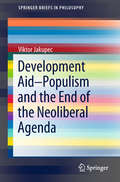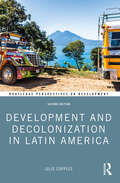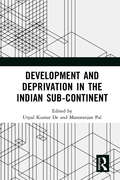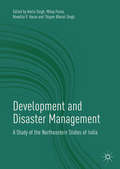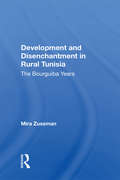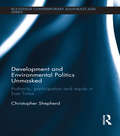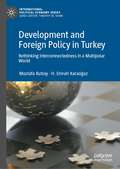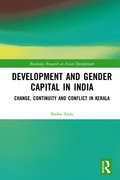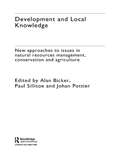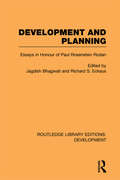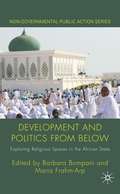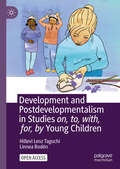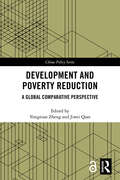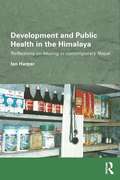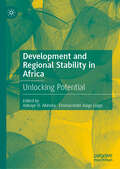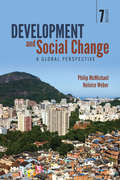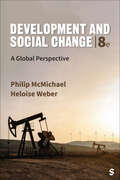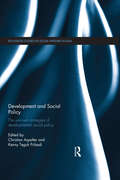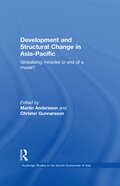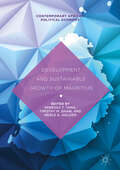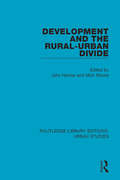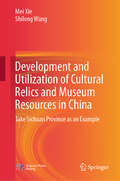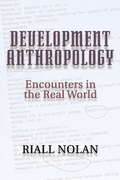- Table View
- List View
Development Aid—Populism and the End of the Neoliberal Agenda (SpringerBriefs in Philosophy)
by Viktor JakupecThis volume examines the impact of the Trump presidency on development aid. It starts out by describing the rise of national populism, the political landscape and the reasons for rejection of the political establishment, both under Trump and internationally. Next, it gives a historical-political overview of development aid in the post WW-II era and discusses the dominant Washington Consensus doctrine and its failure. It then provides a critique of the Official Development Assistance (ODA) discourse and reviews the political economy of ODA, the discourse, and the conditionalities that are barriers to socio-economic development. The final chapters explore the question of Trumponomics as an alternative to the global neoliberal ODA, and the potential impact of Trumponomics' on ODA. The book concludes with thoughts on the potential future directions for ODA within the 'ideals' of Trumponomics and national populism.
Development and Decolonization in Latin America (Routledge Perspectives on Development)
by Julie CupplesWritten in an accessible language, this book is a fully updated and revised edition of Latin American Development, a text that provides a comprehensive introduction to Latin American development in the twenty-first century and is anchored in decolonial theory and other critical approaches. This new edition has been revised and updated in a way that takes into account recent changes in political leadership, the retreat of the Pink Tide, the Colombian peace accords, new forms of political and territorial mobilization, the intensification of extractivism, murders of environmental defenders, major disasters, and the new contours of feminist and anti-patriarchal struggles. It features new chapters on decolonial theory, Latin America in the world, disastrous development, Afrodescendant struggles, and the Latin American city. The book emphasizes political, economic, social, cultural, and environmental dimensions of development and considers key challenges facing the region and the diverse ways in which its people are responding, as well as providing analysis of the ways in which such challenges and responses can be theorized. It explores the region’s historical trajectories, the implementation and rejection of the neoliberal model, and the role played by diverse social movements. It is an indispensable resource for students and university lecturers and professors in development studies, Latin American studies, geography, anthropology, sociology, political science, economics, and cultural studies. In addition, it provides an invaluable introduction to the region for journalists and development practitioners.
Development and Deprivation in the Indian Sub-continent
by Utpal Kumar De Manoranjan PalThe volume covers issues related to poverty, inequality, inclusiveness development, role of institutions, and socio-political perspectives on development in India with a special focus on North-East India. Please note: Taylor & Francis does not sell or distribute the Hardback in India, Pakistan, Nepal, Bhutan, Bangladesh and Sri Lanka
Development and Disaster Management: A Study of the Northeastern States of India
by Amita Singh Milap Punia Nivedita P. Haran Thiyam Bharat SinghThis book highlights the relationship between disasters and development through a socio-cultural study of human geography and governance institutions. It studies the cause, context and consequences of disasters in one of the most fragile Himalayan regions in India. The book establishes the fact that disaster management is built within the framework of good governance, without which it has no meaning. For lack of effective and responsive governance, development has lagged behind and even though the frequency of disasters has been increasing, little is being done to redesign developmental frameworks to prevent ensuing losses. Besides, the near absence of governmental support during recurrent disasters, communities have cumulatively become reservoirs of innovations to cope up with disasters. The resilience plans need not follow implanted models but may be cost effective only if they apply a bottom up approach. Just as the region is culturally diverse so are the challenges encountered by local communities in terms of generating resilience to every disaster. Despite more than a decade of the Disaster Management Act (DMA) of 2005, most of the states in this northeastern fringe of India continue to wait for its implementation beyond mere structures and offices. The book suggests that urgent action is required in accordance with the DMA 2005 towards inter-agency coordination, proactive participation of local governance, mobilization of Community based Organizations (CBOs) and curriculum based training in every academic and technical institution. Governments of these northeastern states of India should establish accountability of State Disaster Management Authorities and inspire them to participate proactively with communities for an effective resilience building in the region.
Development And Disenchantment In Rural Tunisia: The Bourguiba Years
by Mira ZussmanMy first introduction to the lower Medjerda Valley was in 1976 byWerner Kiene, then director of economic development programs in NorthAfrica for the Ford Foundation, and by professors Ali Ben Zaid Salmi andMonee£ Ben Said, codirectors of the Department of Rural Social Sciences atthe National Agronomy Institute of Tunisia (INA TI. The region ofMedjerdaturned out to be an ideal fieldsite, and I am grateful to the team at INAT forintroducing me to the region. My fieldwork in the late 1970s was supportedby two sources: A Fulbright Hays Research Fellowship and an InternationalDoctoral Research Fellowship provided jointly by the Social Science ResearchCouncil (SSRC) and the American Council for Learned Societies. Subsequenttravel grants from the Center for Middle Eastern Studies at the Universityof California, Berkeley, and California State University Faculty ResearchGrants also were instrumental to this study. Without the financial supportof these organizations, this research could riot have been conducted.
Development and Environmental Politics Unmasked: Authority, Participation and Equity in East Timor (Routledge Contemporary Southeast Asia Series)
by Christopher J. ShepherdFocusing on rural development and environmental management, this book brings together the detailed history of development in East Timor under two colonial regimes and under the contemporary conditions of national independence. It addresses two comparative areas of development: across the three political regimes and across four case studies of projects delivered by various national or international development agencies in independent East Timor. Employing an original classificatory framework for kinds of approaches to development – coercive orders, mandated orders, negotiated orders – the book covers the plantation-centred development of Portuguese Timor as a European colony and the integration-oriented development of ‘Timor Timur’ as Indonesia’s 27th province. It examines the neoliberal ‘democratic’ development of East Timor (or Timor-Leste) in the current context of state and nation-building, before drawing on case studies to investigate how development proceeds as a negotiation between authoritative state, non-state and international actors and local people who need to adapt development and conservation projects to suit their lived realities. By using the history of East Timor to explore how particular modes of operationalising development interventions are intimately intertwined with the broader political system, this book makes a valuable contribution to the fields of Development Studies, Anthropology, Science and Technology Studies, and Southeast Asian Studies.
Development and Foreign Policy in Turkey: Rethinking Interconnectedness in a Multipolar World (International Political Economy Series)
by Mustafa Kutlay H. Emrah KaraoğuzThis book sketches an institutional political economy framework to discuss the interaction between development and foreign policy in the global South with reference to Turkey. The authors argue that although the developmental state framework has commonly been employed to explore domestic economic development processes without analytically focusing on the foreign policy dimension, developmental state institutions are highly relevant in the creation and pursuit of a development-oriented foreign policy at a time of growing uncertainty marred by geopolitical and geoeconomic tensions. The book develops a two-level ‘Regime Coherence Framework’ to account for the domestic and international dimensions of development-oriented foreign policy. The main argument posits that the development regime in Turkey and associated foreign policies lack coherence, due to weak institutional complementarities between economic governance, state-business relations, and financial statecraft at the domestic-external nexus.
Development and Gender Capital in India: Change, Continuity and Conflict in Kerala (Routledge Research on Asian Development)
by Shoba ArunThe Indian state of Kerala has invoked much attention within development and gender debates, specifically in relation to its female capital- an outcome of interrelated historical, cultural and social practices. On the one hand, Kerala has been romanticised, with its citizenry, particularly women, being free of social divisions and uplifted through educational well-being. On the other hand, its realism is stark, particularly in the light of recent social changes. Using a Bourdieusian frame of analysis, Development and Gender Capital in India explores the forces of globalisation and how they are embedded within power structures. Through narratives of women’s lived experiences in the private and public domains, it highlights the ‘anomie of gender’ through complexities and contradictions vis-à-vis processes of modernity, development and globalisation. By demonstrating the limits placed upon gender capital by structures of patriarchy and domination, it argues that discussions about the empowered Malayalee women should move from a mere ‘politics of rhetoric and representation’ to a more embedded ‘politics of transformation’, meaningfully taking into account women’s changing roles and identities. This book will be of interest to scholars and students of Development Studies, Gender Studies, Anthropology and Sociology.
Development and Local Knowledge: New Approaches To Issues In Natural Resources Management, Conservation And Agriculture (Studies in Environmental Anthropology)
by Alan Bicker Paul Sillitoe Johan PottierThere is a revolution happening in the practice of anthropology. A new field of 'indigenous knowledge' is emerging, which aims to make local voices hear and ensure that development initiatives meet the needs of indigenous people.Development and Local Knowledge focuses on two major challenges that arise in the discussion of indigenous knowledge - its proper definition and the methodologies appropriate to the exploitation of local knowledge. These concerns are addressed in a range of ethnographic contexts.
Development and Planning: Essays in Honour of Paul Rosenstein-Rodan (Routledge Library Editions: Development)
by Paul Rosenstein RodanFirst published in 1972, this is a book of essays offered in honour of Paul Rosenstein-Rodan, the distinguished economist whose career started in mid-1920s Vienna and subsequently spanned Europe, Britain, the USA and many of the less developed countries of the world.The book includes reviews of past developments, chapters on development trade and value theory, an assessment of contemporary emerging economic patterns, development and trade policy, and investment policy. Further essays cover the intellectual history of development economics, general aspects of growth and economic policy in underdeveloped countries and the problems of income distribution and sectoral and regional development.
Development and Politics from Below
by Barbara Bompani Maria Frahm-ArpReligion is playing an increasingly central role in African political and developmental life. This book offers an empirical and theoretical reflection on the relationships between religion, politics and development in Africa; the meanings of religion in non-Western contexts and the way that is embedded in the everyday life of people in Africa.
Development and Postdevelopmentalism in Studies on, to, with, for, by Young Children
by Hillevi Lenz Taguchi Linnea BodénThis open access book directs its attention to a desire for inter- and transdisciplinary, reciprocal collaborations in studies concerning young children. It focuses on the possibilities and obstacles in collaborative forms of inquiry involving those stakeholders and actors whom the research concerns, specifically the participating children. The backdrop of the discussions and theoretical investigations is the inter- and transdisciplinary project Enhancing Children’s Attention. Within the framework of an evidence-based intervention, this project performed multiple qualitative forms of inquiry, including emergent forms of collaborations with children. The book provides a discussion on how young children’s development, learning, and lives are understood in the developmental sciences, and in the humanities and social sciences. It specifically addresses scholars interested in postdevelopmental, posthumanist, new materialist, and postqualitative approaches. The book proposes a displaced form of postdevelompentalism for future collaborative forms of inquiry with a focus on multiple forms of knowledge and knowing.
Development and Poverty Reduction: A Global Comparative Perspective (China Policy Series)
by Yongnian Zheng Jiwei QianAlthough the absolute number of poor people in the world has declined significantly in recent decades, poverty reduction continues to be a very important issue. There still are very large numbers of poor people, relative poverty is an increasingly concerning problem, and progress on poverty reduction varies enormously from one part of the world to another. Factors contributing to poverty reduction include economic growth, economic integration, and specific poverty-reduction programs, which are often initiated by Western countries. This book considers poverty reduction from a global perspective. Development and Poverty Reduction looks at a wide range of specific subjects, across all continents. It highlights in particular how the issues are perceived from a non-Western perspective and especially how the rise of China is both having a profound impact on poverty reduction globally and also changing the overall way in which development and poverty reduction are approached.
Development and Public Health in the Himalaya: Reflections on healing in contemporary Nepal (Routledge/Edinburgh South Asian Studies Series)
by Ian HarperEngaging with a range of public health issues, this book charts important social and political transitions in Nepal through the lens of medicine and health development. It focuses on mission health care institutions, tuberculosis control programmes as a site of medical intervention, the "pharmaceuticalization" of mental health and public health, and in relation to development ideologies the attempted creation of modern subjects and citizens to advance the health of the nation. Based on two decades of experience, both as a physician and public health professional and an anthropologist, the author presents these issues through four case studies of health programme intervention in a district in central Nepal to show the inter-related aspects of the processes. The book explains how local realities align with, resist, and are complicated by globalized narratives and practices of health and development. It pays careful attention to traditional healers, infectious disease, micronutrient initiatives, mental health and the historical, ideological, and political-economic context of mission-based development work. Offering an ethnographic picture of the challenges and possibilities for action that exist in Nepal , this book is of interest to academics in the field of medical and development anthropology and those working directly in the fields of health and development.
Development and Regional Stability in Africa: Unlocking Potential
by Adeoye O. Akinola Emmaculate Asige LiagaThis book critically engages with the development-security nexus in contemporary Africa, coinciding with the twentieth anniversary of the African Union (AU). Despite widespread discourse on the 'Africa Rising' narrative, many African states grapple with persistent economic challenges, violent conflicts, Afrophobia, and democratic setbacks. The AU's efforts, alongside those of other regional actors, to leverage regionalism for driving socio-economic and political development while ensuring peace and security have yielded limited results. Consequently, this edited volume takes an incisive approach to unpack the complex and vexed issues obstructing sustainable advancements in security and development in Africa. While existing studies have predominantly centered on conventional conflict and development concerns, this book sheds light on the emerging realities and evolving dynamics shaping the region's trajectory. Utilising a comprehensive case study approach, the book places Africa's challenges within both historical and contemporary contexts, aiming to present sustainable policy options to bridge the myriad gaps in the continent's peace, security, and governance architecture. By addressing the intricacies of balancing individual state interests with collective regional advancement, this volume offers a pathway toward unlocking Africa's potential for development and fostering a prosperous and harmonious 'Africa We Want'.
Development and Social Change: A Global Perspective
by Philip McMichael Heloise WeberDevelopment and Social Change: A Global Perspective explains how development thinking and practice have shaped our world. It introduces students to four interconnected projects, and how their dynamics, contradictions and controversies have influenced development trajectories: colonialism, the development era, the neoliberal globalization project, and sustainable development. Authors Philip McMichael and Heloise Weber use case studies and examples to help describe a complex world in transition. Students are encouraged to see global development as a contested historical project. By showing how development stems from unequal power relationships between and among peoples and states, often with planet-threatening environmental outcomes, it enables readers to reflect on the possibilities for more just social, ecological and political relations.
Development and Social Change: A Global Perspective
by Philip McMichael Heloise WeberDevelopment and Social Change: A Global Perspective explains how development thinking and practice have shaped our world. It introduces students to four interconnected projects, and how their dynamics, contradictions and controversies have influenced development trajectories: colonialism, the development era, the neoliberal globalization project, and sustainable development. Authors Philip McMichael and Heloise Weber use case studies and examples to help describe a complex world in transition. Students are encouraged to see global development as a contested historical project. By showing how development stems from unequal power relationships between and among peoples and states, often with planet-threatening environmental outcomes, it enables readers to reflect on the possibilities for more just social, ecological and political relations.
Development and Social Change: A Global Perspective
by Philip McMichael Heloise WeberDevelopment and Social Change explores the historical, socio-political, and ecological aspects of development. The Eighth Edition critically engages with the concept of development, tracing its roots and examining its implications in the contemporary world. Authors Philip McMichael and Heloise Weber use case studies and examples to help describe a complex world in transition. Students are encouraged to see global development as a contested historical project. By showing how development stems from unequal power relationships between and among peoples and states, often with planet-threatening environmental outcomes, it enables readers to reflect on the possibilities for more just social, ecological and political relations.
Development and Social Change: A Global Perspective
by Philip McMichael Heloise WeberDevelopment and Social Change explores the historical, socio-political, and ecological aspects of development. The Eighth Edition critically engages with the concept of development, tracing its roots and examining its implications in the contemporary world. Authors Philip McMichael and Heloise Weber use case studies and examples to help describe a complex world in transition. Students are encouraged to see global development as a contested historical project. By showing how development stems from unequal power relationships between and among peoples and states, often with planet-threatening environmental outcomes, it enables readers to reflect on the possibilities for more just social, ecological and political relations.
Development and Social Policy: The Win-Win Strategies of Developmental Social Policy (Routledge Studies in Social Welfare in Asia)
by Christian Aspalter Kenny Teguh PribadiIn recent years, government and policymakers around the world have shifted their attention away from money-oriented, supply-side economics to institutional economics and people-oriented social and economic development. Issues such as poverty reduction, win-win solutions and strategies in social policy and their implementation, universalization, and a variety of new large-scale conditional cash transfers programs have become ever-present in the global discussion about development and social policy. <P><P>This book provides win-win strategies for social policies on the ground, as developed and put forward by the normative theoretical paradigm of Developmental Social Policy (DSP). Taking the state-of-the-art general development theory as a starting point of reference and discussion, it goes on to discuss in detail the key win-win strategies that form the basis and core of the DSP paradigm. It examines key related issues such as the performance of provident fund systems, the performance of conditional cash transfer systems (especially their elements that are based on asset- and means-testing), universalism and extension in social security provision in the context of especially developing countries, and "non-economically targeted" social welfare benefits and services. <P><P>Providing fully-fledged theoretical guidance paired with key social policy strategies and solutions, it will be highly valuable for students and scholars of social policy, development studies, and Asia Pacific studies.
Development and Structural Change in Asia-Pacific: Globalising Miracles or the end of a Model? (Routledge Studies in the Growth Economies of Asia #Vol. 43)
by Martin Andersson Christer GunnarssonThe authors consider how the Asia-Pacific economies have developed since the financial crises and highlight two inter-related themes: the effect of global forces on the national Asian economies and the different development paths of these economies as they jointly enter this new phase. Questions raised by the book include:* is globalization a threat to development and prosperity in the Asia-Pacific or did globalization rather facilitate and accelerate the pace of industrialization among late industrializers in the region?* is there a single Asia-Pacific development model or did the crisis show this to be false?* did the financial crisis reveal structural weaknesses in an Asia-Pacific state-led model or was state leadership already in demise?Development and Structural Change in Asia-Pacific provides a useful and relevant account of how the global economy has led to structural changes within Asian economies
Development and Sustainable Growth of Mauritius (Contemporary African Political Economy)
by Vanessa T. Tang Timothy M. Shaw Merle G. HoldenThis edited volume analyzes the Mauritius economy and highlights what conditions and policies have contributed to the development of the country. The project gives a historical and economic analysis of Mauritius and provides comparative approaches looking at other developing states in Africa and Asia. This book is intended for a broad audience, consisting of not only economists with quantitative expertise but also other social scientists, policymakers and scholars interested in the intellectually fascinating exploration of Mauritius’s rapid rise and sustained growth performance.
Development and the Rural-Urban Divide (Routledge Library Editions: Urban Studies #11)
by John Harriss Mick MooreFirst published in 1984. It is widely acknowledged that rural-urban differences and interrelationships play an important role in the development process. Some theorists believe they are a primary cause of continuing poverty in poor nations. This volume of essays summarises and appraises theories of rural-urban relations and economic development and explores, mainly on the basis of country case studies, the conceptual and theoretical problems to which they give rise, and the extent to which they correspond to recent experiences in the Third World.
Development and Utilization of Cultural Relics and Museum Resources in China: Take Sichuan Province as an Example
by Mei Xie Shilong WangThis book offers fresh critical insights to the field of cultural and museum resources, aiming to explore its transformation and utilization from the cultural value theory. This book for the first time examines the current situation of cultural and museum resources in Sichuan province and proposes that museum cultural creative industries are a new development trend. The content is divided into four sections but interrelated sections to highlight the importance and rationalities of the utilization of cultural and museum resources in Sichuan province. It begins with an exploration of the current situation of cultural and museum resources. This is followed by a section that illustrates the existing issues in the process of its utilization. Lastly, it reveals the influencing factors, experiences, and value of utilization of cultural and museum resources. This book is extremely useful to readers in museums, cultural heritage, and cultural policies studies, cultural industries not just it offers substantive content on museum knowledge, but also because it offers conceptual tools for studying Chinese museum cultural creative industries from a different perspective and re-discusses the relationship between utilization (commercial value) and protection (archaeological value) of museums, and provides some suggestions for policymakers and museum managers.
Development Anthropology
by 2 Nolan Riall NolanDevelopment Anthropology is a detailed examination of how anthropology is used in international development projects. Written from a practitioner's standpoint, and containing numerous examples and case studies, the book aims to provide students with a comprehensive overview of what development anthropologists do, how they do it, and what problems they encounter in their work. The first part of the book looks at the evolution of both applied anthropology and international development, and how these have been involved with each other since the 1950s. The second, and main, part of the book focuses on how development projects work, and how anthropology is used in their design, implementation, and evaluation. The final section of the book looks at how both development and anthropology must change in order to be more effective. An appendix outlines what students should do to plan a career in development anthropology.
